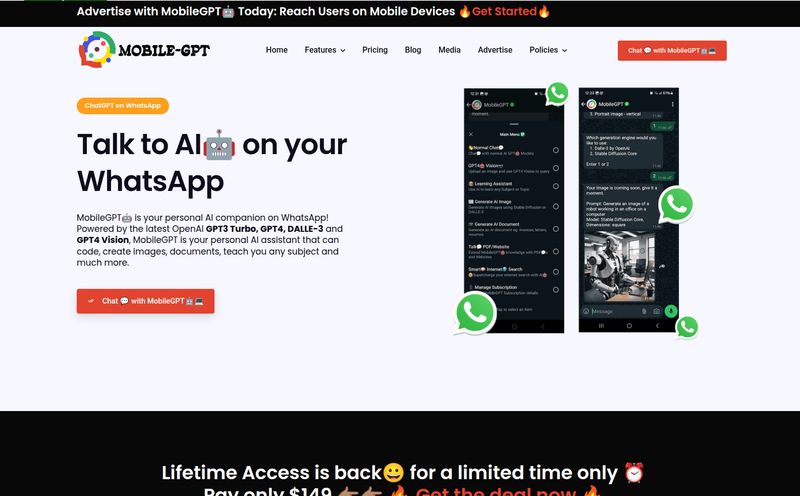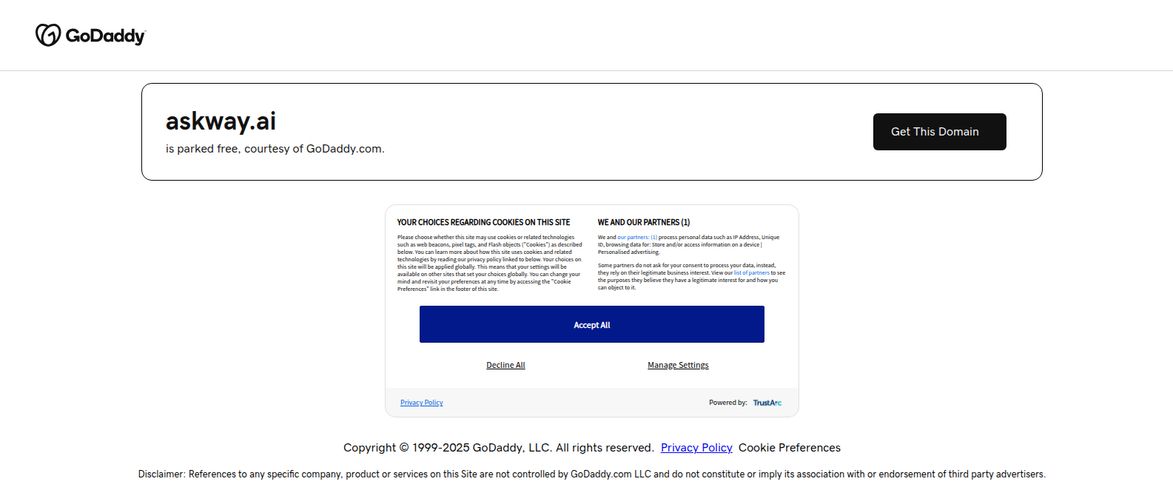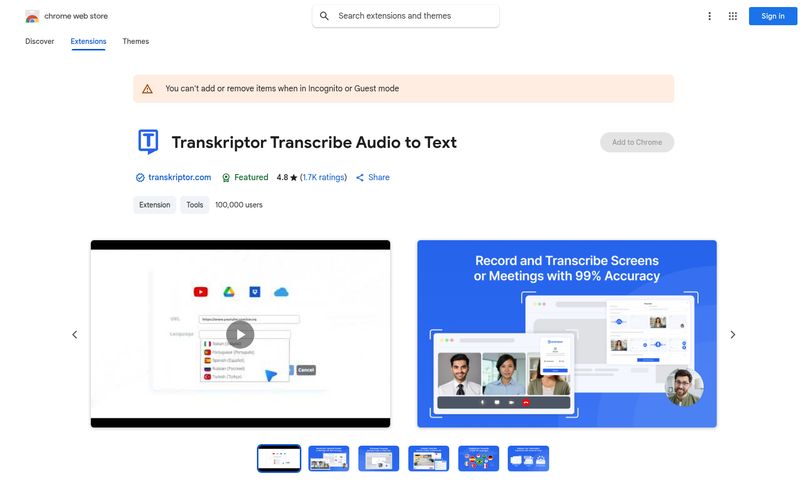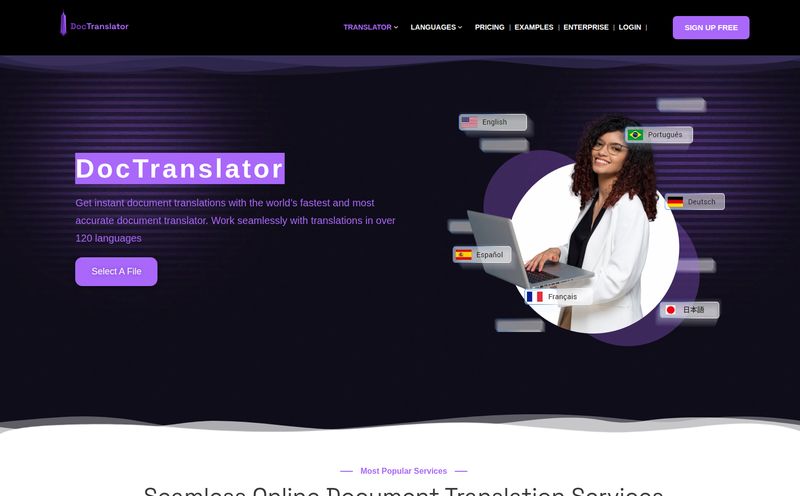If you’re anything like me, you know the feeling. The raws for the latest chapter of your favorite manga just dropped in Japan, and the internet is already buzzing with spoilers. You’re desperate to know what happens next, but the scanlation team—bless their hardworking souls—is still a few days away from releasing their version. It's a special kind of torture, right? You’re stuck refreshing pages, dodging spoilers on Twitter, and generally feeling left out.
For years, the solution was either learning the language or just… waiting. But we live in the age of AI, where everything is being automated, from writing code to making questionable art. So, naturally, the question arises: can AI solve this problem for us manga fiends? I recently stumbled upon a tool called simply 漫画翻译器 (Manga Translator), which claims to be an AI-powered solution for this very predicament. And my curiosity, let me tell you, went into overdrive.
So, What Exactly is This 漫画翻译器?
On the surface, it’s a beautifully simple promise. It’s a tool that uses artificial intelligence to translate manga—specifically from Japanese, Chinese, and Korean—right on your device. This covers the big three: Japanese manga, Korean manhwa, and Chinese manhua. A triple threat.
The information available is a bit sparse, but it touts itself as being “platform independent.” Now, what does that mean? My inner tech geek starts spinning theories. Is it a browser extension that overlays translations on webtoons? Or maybe a standalone app that uses your camera or screenshots to read and translate the text within the speech bubbles? The images I've seen just show a generic App Store “Connecting…” screen, which suggests it’s an iOS app, but the whole “platform independent” thing throws a wrench in that. It’s all a bit mysterious, which is both intriguing and a little bit of a red flag.

Visit 漫画翻译器
The core idea, though, is to cut out the middleman. No more waiting. You find the raw chapter, and this tool, in theory, makes it readable in seconds. A game-changer, if it works.
The Good, The Bad, and The AI-Generated
Like any new piece of tech, especially one powered by AI, it’s going to have its highs and lows. It's not magic, it’s code. And code, like people, can be a little quirky.
The Upside of Instant Gratification
The main selling point is speed. Blazing, wonderful, I-need-to-know-what-happens-now speed. The ability to instantly get the gist of a story is a massive win. And the fact that it supports Japanese, Chinese, and Korean is fantastic. I’ve been getting really into some manhwa lately, and finding quality, up-to-date translations can sometimes be even harder than for mainstream manga. The creators also say it's easy to use, and I believe it. The best tools in this space are the ones that don't require a computer science degree to operate. Point, click, read. Simple.
Where The Cracks Start to Show
Okay, let's be real. The biggest caveat, listed right in its own cons, is that the “translation quality may vary.” This is the Achilles' heel of all machine translation. It's like having an interpreter who’s a genius-level polyglot but also had three martinis at lunch. They’ll get the general message across, but the poetry? The subtle jokes? The character-specific honorifics that tell you everything about a relationship? Yeah, that’s probably going out the window.
The other con is the “limited information provided.” And I feel this one personally. As someone who reviews and analyzes these things, the lack of a clear website, developer info, or a pricing page is… odd. It makes me wonder about the support and long-term viability of the project. Transparency builds trust, and right now, this tool is wearing a trench coat and a fedora in a dark alleyway.
The Million-Dollar Question: Is The Translation Actually Good?
This is what it all comes down to, isn't it? And the answer is almost certainly: it depends on your definition of “good.”
Let's not downplay the progress of AI. Neural Machine Translation (NMT), the tech likely powering this, is miles ahead of the clunky, literal translations of a decade ago. I mean, we've all seen those hilarious, nonsensical menu translations. NMT is much better at understanding context. But manga is a uniquely tough medium. You’ve got:
- Idioms and Slang: Expressions that make zero sense when translated literally.
- Cultural Nuance: Concepts that don’t have a one-to-one equivalent in English.
- Character Voice: A gruff old man shouldn't sound like a bubbly teenage girl. AI struggles with maintaining a consistent voice.
- Onomatopoeia (SFX): The iconic ゴゴゴゴ (gogogogo) for “menacing” or シーン (shiin) for “silence.” Translating these is an art form that AI just hasn't mastered.
A human scanlation team agonizes over these details. They add translation notes to explain a pun. They meticulously photoshop the new text into the bubbles, matching the font and style. That's a level of artistry and passion that, in my opinion, an algorithm can't replicate. An AI translator gives you the script; a scanlator gives you the performance.
So, will it be good? For plot points, probably yes. For the soul of the story? Probably not.
Who Should Actually Use an AI Manga Translator?
I don't think this is a one-size-fits-all tool. I see it fitting a few specific niches.
First, there's The Impatient Fan. This is the person who lives and breathes a series. They follow the author on social media, they’re active in the fandom, and the week-long wait for a translation is agony. For them, a tool like this is perfect for a “first pass” read to quench that thirst for spoilers. They’ll still read the high-quality fan or official release later for the real experience.
Then you have The Language Learner. What a fantastic study aid! If you’re learning Japanese, Korean, or Chinese, you can try reading the raw manga yourself and then use this tool to check your work. It's a low-stakes way to practice with authentic materials. Its a cool way to learn, honestly.
Finally, there's The Explorer. This reader loves digging up obscure or older series that never got popular enough to attract a dedicated scanlation team. For them, an AI translator might be the only way to ever experience that story in their native language.
Who isn't this for? The purists. The readers who savor every panel and appreciate the craft of localization. If that’s you, stick to the official releases on platforms like VIZ's Shonen Jump or Manga Plus and support the incredible work of scanlators.
Let's Talk About the Price... Or Lack Thereof
This is where things get even murkier. The provided info has no pricing details. None. Is it free? Supported by ads? A one-time purchase on the App Store? A subscription model? We just don't know. This lack of transparency is a little worrying for me. I’m always hesitant to pour time into a tool if I don't understand its business model. Will it suddenly throw up a paywall? Start harvesting my data? It's a big question mark that hangs over an otherwise interesting product.
Frequently Asked Questions About AI Manga Translators
- 1. Is it legal to use an AI manga translator?
- That's a bit of a grey area. The act of using the translator itself isn't illegal. However, you typically have to acquire the raw manga files first, which are often shared without the publisher's permission. The most ethical route is always to support official releases when available.
- 2. Can these tools translate handwritten text or sound effects?
- It depends on the sophistication of the Optical Character Recognition (OCR) tech. Standard, clean fonts in speech bubbles? Easy. Stylized, handwritten text or the artistic sound effects (SFX) that are part of the art? That's a huge challenge. I'd expect mixed-to-poor results on that front.
- 3. How is this different from just using Google Translate on a screenshot?
- It's likely built on similar core technology, but a dedicated manga tool should be better optimized. It's trained to identify and isolate text within panels and bubbles, and it might even have a feature to overlay the translated text back onto the image, which is more convenient than pointing your phone camera at another screen.
- 4. Will AI translators replace human scanlators?
- In my opinion, no. Not anytime soon. They serve different purposes. AI offers speed and convenience for getting the plot. Humans offer quality, cultural context, and artistry. I see it as a supplementary tool, not a replacement. There’s a community and a passion in scanlation that an algorithm can’t replicate.
- 5. Where can I find the 漫画翻译器 tool?
- Based on the available images, it appears to be an app on Apple's App Store. However, the lack of a direct link or concrete information makes it difficult to find. You may have to search for it directly by its Japanese name: 漫画翻译器.
My Final Thoughts
So, is the 漫画翻译器 the holy grail for manga fans? No, not yet. But is it a fascinating and potentially useful tool? Absolutely. It represents a trade-off: you sacrifice the quality and nuance of a human translation for the incredible benefit of speed and accessibility.
For die-hard fans who just can’t wait, or for readers of niche series, it could be a fantastic companion. It’s a tool for the curious and the impatient. For now, I’ll still be eagerly awaiting the releases from my favorite scanlation groups and buying the official volumes to support the creators. But will I keep an eye on this tech and maybe use it to peek at some raws when my patience wears thin? You bet I will.



